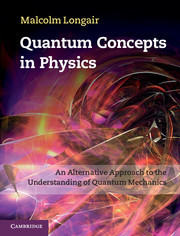Description
Quantum Concepts in Physics
An Alternative Approach to the Understanding of Quantum Mechanics
Author: Longair Malcolm
Innovative account of the origins of quantum mechanics told from a historical perspective, for advanced undergraduates, graduate students and researchers.
Language: English
Subject for Quantum Concepts in Physics:
Approximative price 71.13 €
In Print (Delivery period: 14 days).
Add to cart
Publication date: 01-2013
459 p. · 19.1x24.9 cm · Hardback
459 p. · 19.1x24.9 cm · Hardback
Description
/li>Contents
/li>Biography
/li>
Written for advanced undergraduates, physicists, and historians and philosophers of physics, this book tells the story of the development of our understanding of quantum phenomena through the extraordinary years of the first three decades of the twentieth century. Rather than following the standard axiomatic approach, this book adopts a historical perspective, explaining clearly and authoritatively how pioneers such as Heisenberg, Schrodinger, Pauli and Dirac developed the fundamentals of quantum mechanics and merged them into a coherent theory, and why the mathematical infrastructure of quantum mechanics has to be as complex as it is. The author creates a compelling narrative, providing a remarkable example of how physics and mathematics work in practice. The book encourages an enhanced appreciation of the interaction between mathematics, theory and experiment, helping the reader gain a deeper understanding of the development and content of quantum mechanics than any other text at this level.
Part I. The Discovery of Quanta: 1. Physics and theoretical physics in 1895; 2. Planck and black-body radiation; 3. Einstein and quanta, 1900–1911; Part II. The Old Quantum Theory: 4. The Bohr model of the hydrogen atom; 5. Sommerfield and Ehrenfest – generalising the Bohr model; 6. Einstein coefficients, Bohr's correspondence principle and the first selection rules; 7. Understanding atomic spectra – additional quantum numbers; 8. Bohr's model of the periodic table and the origin of spin; 9. The wave-particle duality; Part III. The Discovery of Quantum Mechanics; 10. The collapse of the old quantum theory and the seeds of its regeneration; 11. The Heisenberg breakthrough; 12. Matrix mechanics; 13. Dirac's quantum mechanics; 14. Schrödinger and wave mechanics; 15. Reconciling matrix and wave mechanics; 16. Spin and quantum statistics; 17. The interpretation of quantum mechanics; 18. The aftermath; 19. Epilogue; Indices.
Malcolm Longair is Emeritus Jacksonian Professor of Natural Philosophy and Director of Development at the Cavendish Laboratory, University of Cambridge. He has held many highly distinguished positions within physics and astronomy and has served on and chaired many international committees, boards and panels, working with both NASA and the European Space Agency. He has received much recognition for his work, including the Pilkington Prize of the University of Cambridge for Excellence in Teaching and a CBE in the millennium honours list for his services to astronomy and cosmology. His previous well-received books for Cambridge University Press include Theoretical Concepts in Physics (2003), The Cosmic Century: A History of Astrophysics and Cosmology (2005) and High Energy Astrophysics (2011).
© 2024 LAVOISIER S.A.S.

